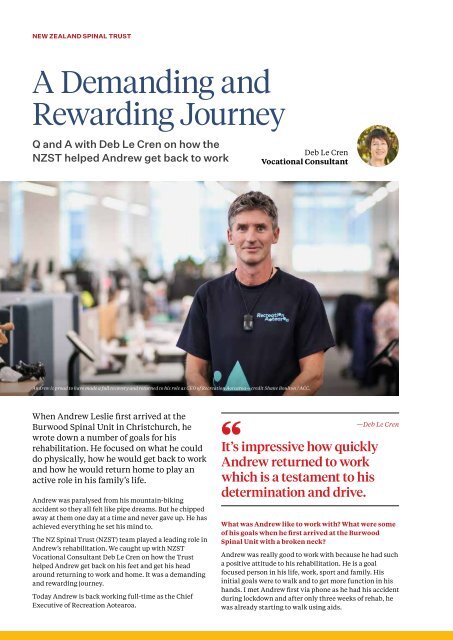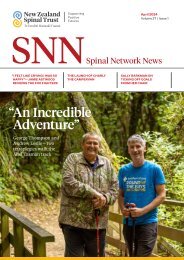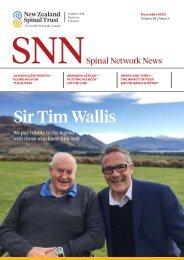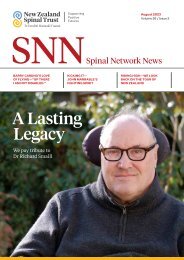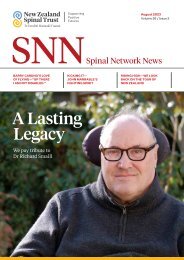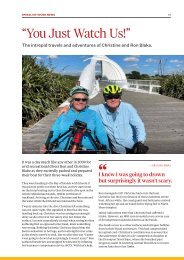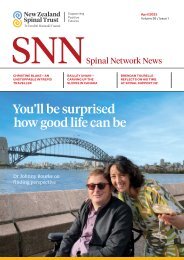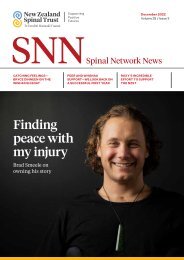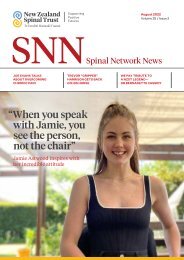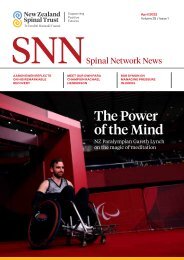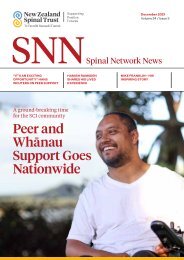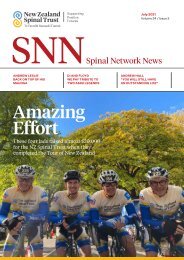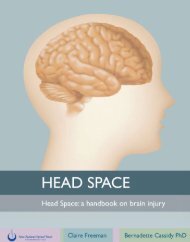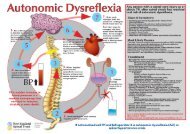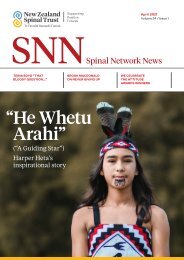SNN_Story_A Demanding and Rewarding Journey
You also want an ePaper? Increase the reach of your titles
YUMPU automatically turns print PDFs into web optimized ePapers that Google loves.
NEW ZEALAND SPINAL TRUST<br />
A <strong>Dem<strong>and</strong>ing</strong> <strong>and</strong><br />
<strong>Rewarding</strong> <strong>Journey</strong><br />
Q <strong>and</strong> A with Deb Le Cren on how the<br />
NZST helped Andrew get back to work<br />
Deb Le Cren<br />
Vocational Consultant<br />
Andrew is proud to have made a full recovery <strong>and</strong> returned to his role as CEO of Recreation Aotearoa—credit Shane Boulton / ACC.<br />
When Andrew Leslie first arrived at the<br />
Burwood Spinal Unit in Christchurch, he<br />
wrote down a number of goals for his<br />
rehabilitation. He focused on what he could<br />
do physically, how he would get back to work<br />
<strong>and</strong> how he would return home to play an<br />
active role in his family’s life.<br />
Andrew was paralysed from his mountain-biking<br />
accident so they all felt like pipe dreams. But he chipped<br />
away at them one day at a time <strong>and</strong> never gave up. He has<br />
achieved everything he set his mind to.<br />
The NZ Spinal Trust (NZST) team played a leading role in<br />
Andrew’s rehabilitation. We caught up with NZST<br />
Vocational Consultant Deb Le Cren on how the Trust<br />
helped Andrew get back on his feet <strong>and</strong> get his head<br />
around returning to work <strong>and</strong> home. It was a dem<strong>and</strong>ing<br />
<strong>and</strong> rewarding journey.<br />
Today Andrew is back working full-time as the Chief<br />
Executive of Recreation Aotearoa.<br />
—Deb Le Cren<br />
It’s impressive how quickly<br />
Andrew returned to work<br />
which is a testament to his<br />
determination <strong>and</strong> drive.<br />
What was Andrew like to work with? What were some<br />
of his goals when he first arrived at the Burwood<br />
Spinal Unit with a broken neck?<br />
Andrew was really good to work with because he had such<br />
a positive attitude to his rehabilitation. He is a goal<br />
focused person in his life, work, sport <strong>and</strong> family. His<br />
initial goals were to walk <strong>and</strong> to get more function in his<br />
h<strong>and</strong>s. I met Andrew first via phone as he had his accident<br />
during lockdown <strong>and</strong> after only three weeks of rehab, he<br />
was already starting to walk using aids.
SPINAL NETWORK NEWS<br />
How has the NZ Spinal Trust supported Andrew in his<br />
rehabilitation?<br />
The Trust provided Andrew with a range of support along<br />
his journey. For me specifically in vocational<br />
rehabilitation, we supported him by being there for<br />
regular discussions with him about his return-to-work<br />
goals <strong>and</strong> supporting his thinking.<br />
During his recovery, how big was his motivation to get<br />
back to work?<br />
It was massive. Andrew was always focused on returning<br />
to work <strong>and</strong> he was in regular contact with his team<br />
during his inpatient stay. The support offered through the<br />
vocational service was to provide a sounding board for<br />
him to talk through his return-to-work ideas <strong>and</strong> to assist<br />
him with creating a timetable so he could begin doing<br />
some work during his stay in Transitional Rehab (TR). We<br />
also discussed managing his energy levels, taking heed of<br />
fatigue <strong>and</strong> adopting a flexible attitude to move work to<br />
another part of the day or week to compensate if needed.<br />
Andrew talked through the set-up in his home office,<br />
using voice-activated software <strong>and</strong> the ongoing support<br />
that ACC can provide with return-to-work planning.<br />
Andrew’s success is not the case for everyone, why<br />
was he so successful in his rehab?<br />
It’s impressive how quickly Andrew returned to work<br />
which is a testament to his determination <strong>and</strong> drive <strong>and</strong><br />
possibly also his sense of responsibility to his team <strong>and</strong><br />
more importantly, his family.<br />
Andrew commented that: “Being back at home is very<br />
different than being in the hospital <strong>and</strong> highlights how<br />
valuable TR is <strong>and</strong> the advice/support from Deb Le Cren<br />
<strong>and</strong> the Spinal Trust. It requires a lot of self-motivation<br />
<strong>and</strong> organisation to continue to progress recovery from<br />
the injury <strong>and</strong> return to a normal life, including work. I<br />
have self-motivation, but it would be difficult for those<br />
that don’t”.<br />
We are proud that we have been able to make a difference<br />
in his recovery <strong>and</strong> it was awesome to see Andrew back to<br />
work <strong>and</strong> living independently less than one year after his<br />
accident.<br />
How does returning to work help an individual from a<br />
mindset point of view?<br />
Getting back to work is usually important for people’s<br />
self-esteem, independence <strong>and</strong> part of their returning to<br />
life as ‘normal’. For those not on ACC funding, getting<br />
back to work is often a financial imperative.<br />
What advice do you offer to others who have sustained<br />
an SCI <strong>and</strong> are looking at getting back into work?<br />
It’s useful for people who are looking to get back into the<br />
workforce to get support from a vocational consultant<br />
who can help them identify their transferrable skills,<br />
values <strong>and</strong> motivators before they start to look for work<br />
<strong>and</strong> also review their CV <strong>and</strong> give them coaching in<br />
interview skills <strong>and</strong> job search. It is scary at first but<br />
talking to someone can really help <strong>and</strong> the benefits of<br />
getting back into the workforce <strong>and</strong> being independent<br />
once again are huge for the person <strong>and</strong> their family.<br />
Andrew says it was scary being told by the doctors that he was a tetraplegic.<br />
“It’s never too late to be what you<br />
might have been.” George Elliot.<br />
The guiding principles for the NZST’s Vocational<br />
Rehabilitation Service are:<br />
• Everyone can have a great job<br />
• It’s healthy to be working<br />
• The sooner the better<br />
• There are thous<strong>and</strong>s of work opportunities<br />
• Personal networks are the key<br />
• The process for getting a job is the same as before<br />
• You can do it yourself – whatever it takes!<br />
• Your life experiences give you unique qualifications<br />
What is Vocational Rehabilitation?<br />
The vocational rehabilitation programme is an early<br />
intervention <strong>and</strong> restorative vocational rehabilitation<br />
program that provides detailed career advice <strong>and</strong><br />
planning, educational support <strong>and</strong> works to reduce the fear<br />
of work <strong>and</strong> remove barriers. The vocational rehab team<br />
are dedicated to getting people who have a spinal cord<br />
injury or acquired illness into meaningful <strong>and</strong> sustainable<br />
employment. Services delivered are specialist work<br />
support, both to acute patients <strong>and</strong> community clients.<br />
The NZ Spinal Trust’s specialist vocational rehabilitation<br />
programme is based at the Burwood <strong>and</strong> Auckl<strong>and</strong><br />
Spinal units <strong>and</strong> also provides services at Middlemore<br />
Hospital.<br />
For more information visit<br />
https://www.nzspinaltrust.org.nz/new-to-sci/<br />
vocational-rehabilitation-service/


